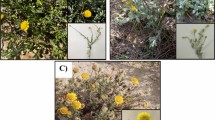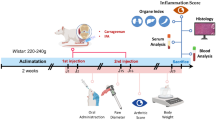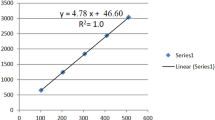Abstract
Arbutus andrachne L. is a medicinal plant that grows in Jordan and has many valuable effects. In the present study, the anti-nociceptive effect of A. andrachne methanolic leaf extract was determined in mice using thermal and chemical tests. Our findings show that different doses of A. andrachne extract reduced the number of writhings significantly compared to control group. The leaf extract also reduced the time of paw licking in the early and late phases of formalin test. In all the conducted tests, 300 mg/kg body wt. was the best effective dose. A peroxisome proliferator-activated receptor alpha (PPARα) antagonist reversed the action of the plant extract in the early phase of formalin test while antagonists of the PPARα, PPAR gamma (PPARγ) and cannabinoid 1 (CB1) receptors were responsible for abolishing its effect in the late phase of this test. Also, the extract administration increased the latency time in hot plate and tail flick, an effect that was reversed by the antagonists of PPARγ, CB1 and transient receptor potential vanilloid 1 (TRPV1). No effect was noticed for α2-adrenergic receptor antagonist in the action of A. andrachne in any of the conducted tests in this study. Furthermore, analysis of the constituents in the methanolic leaf extract using liquid chromatography mass spectrometry (LCMS) showed that the extract is rich in compounds that have anti-nociceptive and/or anti-inflammatory effects such as arbutin, rutin, linalool, linoleic acid, gallic acid, lauric acid, myristic acid, hydroquinone, β-sitosterol, ursolic acid, isoquercetin, quercetin, (+)-gallocatechin, kaempferol, α-tocopherol, myricetin 3-O-rhamnoside and catechin gallate. In conclusion, A. andrachne showed promising anti-nociceptive effects in thermal and chemical models of pain. These findings can open an avenue for natural pain relief.





Similar content being viewed by others
References
Abu-Dahab R, Afifi F (2007) Antiproliferative activity of selected medicinal plants of Jordan against a breast adenocarcinoma cell line (MCF7). Sci Pharm 75:121–136
Abu-zaiton A, Abu-Samak M, Oran S, Yousef I, Abu-Zaitoon Y, Algaramseh A (2019) Hypoglycemic, hypolipidimic and protective effects of Arbutus andrachne extract in streptozotocin induced diabetic rats. Res J Biol Sci 14(3):56–60
Ahmed HA, Alkali IY (2018) In silico molecular docking studies of some phytochemicals against peroxisome-proliferator activated receptor gamma (PPAR-γ). GSC Biol Pharm Sci 5:001–005
Aldossary SA, Alsalem M, Kalbouneh H, Haddad M, Azab B, Al-Shboul O, Mustafa AG, Obiedat S, El-Salem K (2019) The role of transient receptor potential vanilloid receptor 1 and peroxisome proliferator-activated receptors-α in mediating the antinociceptive effects of palmitoylethanolamine in rats. NeuroReport 30(1):32–37
Alsalem M, Altarifi A, Kalbouneh H, Al-Zer H, Azab B, El-Salem K (2016) Role of PPARα and PPARγ in mediating the analgesic properties of ibuprofen in vivo and the effects of dual PPARα/γ activation in inflammatory pain model in the rat. Int J Pharmacol 12(8):812–820
Alsalem M, Haddad M, Aldossary SA, Kalbouneh H, Altarifi A, Jaffal SM, Abbas MA, Aldaoud N, El-Salem K (2019a) Role of cannabinoid receptor 1 and the peroxisome proliferator-activated receptor α in mediating anti-nociceptive effects of synthetic cannabinoids and a cannabinoid-like compound. Inflammopharmacology 27(6):1131–1142
Alsalem M, Haddad M, Aldossary SA, Kalbouneh H, Azab B, Dweik A, Imraish A, El-Salem K (2019b) Effects of dual peroxisome proliferator-activated receptors and activation in two rat models of neuropathic pain. PPAR Res 2019:1–9
Al-Sayed E, Abdel-Daim MM (2018) Analgesic and anti-inflammatory activities of epicatechin gallate from Bauhinia hookeri. Drug Dev Res 79(4):157–164
Alvheim A, Torstensen B, Lin Y, Lillefosse H, Lock EJ, Madsen L, Frøyland L, Hibbeln J, Kjellevold M (2013) Dietary linoleic acid elevates the endocannabinoids 2-AG and anandamide and promotes weight gain in mice fed a low fat diet. Lipids 49(1):59–69
Ambrosino P, Soldovieri MV, De Maria M, Russo C, Taglialatela M (2014) Functional and biochemical interaction between PPARα receptors and TRPV1 channels: potential role in PPARα agonists-mediated analgesia. Pharmacol Res 87:113–122
Amro B, Haddadin R, Tawaha K, Mohammad M, Mashallah S, Assaf A (2013) In vitro antimicrobial and anti-inflammatory activity of Jordanian plant extracts, a potential target therapy for Acne vulgaris. Afr J Pharm Pharmacol 7:2087–2099
Andersen ME (1981) Saturable metabolism and its relationship to toxicity. Crit Rev Toxicol 9(2):105–150
Atrooz O, Omary A, Khamas W, Shaikhly A, Salim M (2007) The effects of alcoholic extract of Arbutus andrachne on some biochemical parameters and visceral organs in rats. Int J Food Sci Tech 42:1046–1051
Baskan C, Kılıc DD, Sırıken B, Tanrikulu G, Gül M, Ertürk O (2019) In vitro study on antioxidant, antibacterial and DNA interaction activities of extracts from Arbutus andrachne L. EJFS 7(3):293–300
Bassaganya-Riera J, Reynolds K, Martino-Catt S, Cui Y, Hennighausen L, Gonzalez F, Rohrer J, Benninghoff AU, Hontecillas R (2004) Activation of PPAR gamma and delta by conjugated linoleic acid mediates protection from experimental inflammatory bowel disease. Gastroenterology 127(3):777–791
Ben-Shabat S, Fride E, Sheskin T, Tamiri T, Rhee M, Vogel Z, Bisogno T, De Petrocellis L, Di Marzo V, Mechoulam R (1998) An entourage effect: inactive endogenous fatty acid glycerol esters enhance 2-arachidonoyl-glycerol cannabinoid activity. Eur J Pharmacol 353:23–31
Berger J, Moller DE (2002) The mechanisms of action of PPARs. Annu Rev Med 53:409–435
Cabral GA, Griffin-Thomas L (2009) Emerging role of the cannabinoid receptor CB2 in immune regulation: therapeutic prospects for neuroinflammation. Exp Rev Mol Med 11:e3–e33
Campbell SE, Stone WL, Whaley SG, Qui M, Krishnan K (2003) Gamma (gamma) tocopherol upregulates peroxisome proliferator activated receptor (PPAR) gamma (gamma) expression in SW 480 human colon cancer cell lines. BMC Cancer 3:25–37
Cazacu I, Mogosan C, Loghin F (2015) Safety issues of current analgesics: an update. Clujul Med 88(2):128–136
Chen Z, Ma C, Song B (1998) The analgesic effect of vitamine E and its mechanism. Chin Pharm J 33:285–288
Chen H, Yu W, Chen G, Meng S, Xiang Z, He N (2018) Antinociceptive and antibacterial properties of anthocyanins and flavonols from fruits of black and non-black mulberries. Molecules (Basel, Switzerland) 23(4):1–13
Costa B, Comelli F, Bettoni I, Colleoni M, Giagnoni G (2008) The endogenous fatty acid amide, palmitoylethanolamide, has anti-allodynic and anti-hyperalgesic effects in a murine model of neuropathic pain: involvement of CB1, TRPV1 and PPARγ receptors and neurotrophic factors. Pain 139(3):541–550
Crouzin N, Ferreira MC, Cohen-Solal C, Barbanel G, Guiramand J, Vignes M (2010) Neuroprotection induced by vitamin E against oxidative stress in hippocampal neurons: involvement of TRPV1 channels. Mol Nutr Food Res 54(4):496–505
Crouzin N, Ferreira MCJ, Cohen-Solal C, M’kadmi C, Bernad N, Martinez J, Barbanel G, Vignes M, Guiramand J (2011) α-Tocopherol and α-tocopheryl phosphate interact with the cannabinoid system in the rodent hippocampus. Free Radic Biol Med 51(9):1643–1655
de Cássia da Silveira E Sá R, Lima TC, da Nóbrega FR, de Brito AEM, de Sousa DP (2017) Analgesic-like activity of essential oil constituents: an update. Int J Mol Sci 18(12):2392–2431
De Melo GO, Malvar Ddo C, Vanderlinde FA, Rocha FF, Pires PA, Costa EA, de Matos LG, Kaiser CR, Costa SS (2009) Antinociceptive and anti-inflammatory kaempferol glycosides from Sedum dendroideum. J Ethnopharmacol 124(2):228–232
Donvito G, Nass SR, Wilkerson JL, Curry ZA, Schurman LD, Kinsey SG, Lichtman AH (2018) The endogenous cannabinoid system: a budding source of targets for treating inflammatory and neuropathic pain. Neuropsychopharmacology 43(1):52–79
Esposito G, Scuderi C, Valenza M, Togna GI, Latina V, De Filippis D, Cipriano M, Carratù MR, Iuvone T, Steardo L, Linden R (2011) Cannabidiol reduces Aβ-induced neuroinflammation and promotes hippocampal neurogenesis through PPARγ involvement. PLoS ONE 6(12):e28668
Fawad K, Islam NU, Subhan F, Shahid M, Ali G, Rahman F, Mahmood W, Ahmad N (2018) Novel hydroquinone derivatives alleviate algesia, inflammation and pyrexia in the absence of gastric ulcerogenicity. Trop J Pharm Res 17(1):53–63
Ganeshpurkar A, Saluja AK (2017) The pharmacological potential of rutin. Saudi Pharm J 25(2):149–164
Gao W, Zan Y, Wang ZJ, Hu XY, Huang F (2016) Quercetin ameliorates paclitaxel-induced neuropathic pain by stabilizing mast cells, and subsequently blocking PKCε-dependent activation of TRPV1. Acta Pharmacol Sin 37(9):1166–1177
Guo BC, Wei J, Su KH, Chiang AN, Zhao JF, Chen HY, Shyue SK, Lee TS (2015) Transient receptor potential vanilloid type 1 is vital for (−)-epigallocatechin-3-gallate mediated activation of endothelial nitric oxide synthase. Mol Nutr Food Res 59(4):646–657
Jaffal SM, Abbas MA (2018) Antinociceptive action of Achillea biebersteinii methanolic flower extract is mediated by interaction with cholinergic receptor in mouse pain models. Inflammopharmacology 27(5):961–968
Janssen PA (1963) The inhibitory effect of fentanyl and other morphine-like analgesics on the warm water induced tactile withdrawal reflex in rat. Arzneimittelforschung 13:502–507
Jia Y, Bhuiyan MJH, Jun HJ, Lee JH, Hoang MH, Lee HJ, Kim N, Lee D, Hwang KY, Hwang BY, Choi D, Lee S (2011) Ursolic acid is a PPAR-α agonist that regulates hepatic lipid metabolism. Bioorg Medl Chem Lett 21(19):5876–5880
Juaira T, Begum N, Yusuf MA, Patwary MA (2018) Effect of αlfa-tocopherol on pain and inflammation of rats. J Curr Adv Med Res 5(1):15–18
Julius D, Basbaum AL (2001) Molecular mechanisms of nociception. Nature 413:203–210
Jun HJ, Lee JH, Kim J, Jia Y, Kim K, Hwang KY, Yun E, Do KR, Lee SJ (2014) Linalool is a PPAR ligand that reduces plasma TG levels and rewires the hepatic transcriptome and plasma metabolome. J Lipid Res 55(6):1098–1110
Kaczocha M, Glaser ST, Deutsch DG (2009) Identification of intracellular carriers for the endocannabinoid anandamide. Proc Natl Acad Sci USA 106:6375–6380
Kaiser J, Yassin M, Prakash S, Safi N, Agami M, Lauw S, Ostrozhenkova E, Bacher A, Rohdich F, Eisenreich W, Safi J (2007) Anti-malarial drug targets: screening for inhibitors of 2C-methyl-d-erythritol 4-phosphate synthase (IspC protein) in Mediterranean plants. Phytomedicine 14(4):242–249
Kim HK, Kim JH, Jun-Li Zhou XG, Lee I, Chung K, Chung JM (2006) Analgesic effect of vitamin E is mediated by reducing central sensitization in neuropathic pain. Pain 122(1–2):53–62
Kim DY, Kim J, Ham HJ, Choue R (2013) Effects of d-alpha-tocopherol supplements on lipid metabolism in a high-fat diet-fed animal model. Nutr Res Pract 7(6):481–487
Korte G, Dreiseitel A, Schreier P, Oehme A, Locher S, Geiger S, Heilmann J, Philipp GS (2009) Tea catechins' affinity for human cannabinoid receptors. Phytomedicine 17:19–22
Lehmann JM, Lenhard JM, Oliver BB, Ringold GW, Kliewer SA (1997) Peroxisome proliferator-activated receptors α and γ are activated by indomethacin and other non-steroidal anti-inflammatory drugs. J Biol Chem 272:3406–3410
Liang YC, Tsai SH, Tsai DC, Lin-Shiau SY, Lin JK (2001) Suppression of inducible cyclooxygenase and nitric oxide synthase through activation of peroxisome proliferator-activated receptor-γ by flavonoids in mouse macrophages. FEBS Lett 496:12–18
LoVerme J, Russo R, La Rana G, Fu J, Farthing J, Mattace-Raso G, Meli R, Hohmann A, Calignano A, Piomelli D (2006) Rapid broad-spectrum analgesia through activation of peroxisome proliferator-activated receptor-α. J Pharmacol Exp Ther 319(3):1051–1061
Milad R, Svs R, Youssef F, Ross S (2017) Secondary metabolites isolated from Pinus roxburghii and interpretation of their cannabinoid and opioid binding properties by virtual screening and in vitro studies. Saudi Pharm J 26(3):437–444
Moreno SS, Farioli-Vecchioli S, Ceru MP (2004) Immunolocalization of peroxisome proliferator-activated receptors and retinoid X receptors in the adult rat CNS. Neuroscience 123:131–145
Nahrstedt A (1992) Flavonoids of Arbutus andrachne L. leaves. Turk J Pharm 2:17–23
Nirmal SA, Pal SC, Mandal SC, Patil AN (2012) Analgesic and anti-inflammatory activity of β-sitosterol isolated from Nyctanthes arbortristis leaves. Inflammopharmacology 20(4):219–224
Okmen AS (2015) Antioxidant and antibacterial activities of different plants extracts against Staphylococcus aureus isolated from soccer player’s shoes and knowledge and applications about foot hygiene of the soccer players. Afr J Tradit Complement Altern Med 12(3):143–149
Oran SA (2014) The status of medicinal plants in Jordan. J Agric Sci Tech 4:46–467
Oran SA (2015) Flora of Bader Al-Jadida County, western high mountains of Amman city/Jordan. Int J Herb Med 3:49–59
O'Sullivan S (2016) An update on peroxisome proliferator-activated receptor (PPAR) activation by cannabinoids. Br J Pharmacol 173:1899–1910
Pandey A, Tripathi SM (2014) Concept of standardization, extraction and pre phytochemical screening strategies for herbal drug. J Pharmacogn Phytochem 2(5):115–119
Patwardhan AM, Akopian AN, Ruparel NB, Diogenes A, Weintraub ST, Uhlson C, Murphy RC, Hargreaves KM (2010) Heat generates oxidized linoleic acid metabolites that activate TRPV1 and produce pain in rodent. J Clin Invest 120(5):1617–1626
Peana A, D'Aquila PS, Chessa M, Moretti L, Serra G, Pippia P (2003) (−)-Linalool produces antinociception in two experimental models of pain. Eur J Pharmacol 460:37–41
Popeijus HE, van Otterdijk SD, van der Krieken SE, Konings M, Serbonij K, Plat J, Mensink RP (2014) Fatty acid chain length and saturation influences PPARα transcriptional activation and repression in HepG2 cells. Mol Nutr Food Res 58(12):2342–2349
Qin G, Ma J, Huang Q, Yin H, Han J, Li M, Deng Y, Wang B, Hassan W, Shang J (2018) Isoquercetin improves hepatic lipid accumulation by activating AMPK pathway and suppressing TGF-β signaling on an HFD-induced nonalcoholic fatty liver disease rat model. Int J Mol Sci 19(12):4126–4140
Quintans-Júnior LJ, Barreto RSS, Menezes PP, Almeida JRGS, Viana AFSC, Oliveira RCM, Oliveira AP, Gelain DP, de Lucca Júnior W, Araújo AAS (2013) β-Cyclodextrin-complexed ( )-linalool produces antinociceptive effect superior to that of ( )-linalool in experimental pain protocols. Basic Clin Pharmacol Toxicol 113(3):167–172
Russo R, LoVerme J, La Rana G, D'Agostino G, Sasso O, Calignano A, Piomelli D (2007) Synergistic antinociception by the cannabinoid receptor agonist anandamide and the PPAR-α receptor agonist GW7647. Eur J Pharmacol 566(1–3):117–119
Scholz A, Gruß M, Vogel W (1998) Properties and functions of calcium-activated K+ channels in small neurones of rat dorsal root ganglion studied in a thin slice preparation. J Physiol 513(1):55–69
Seker M, Toplu C (2010) Determination and comparison of chemical characteristics of Arbutus unedo L. and Arbutus andrachnae L. (family Ericaceae) fruits. J Med Food 13(4):1013–1018
Shashni B, Sharma K, Singh R, Sakharkar K, Dhillon SK, Nagasaki Y, Sakharkar M (2013) Coffee component hydroxyl hydroquinone (HHQ) as a putative ligand for PPAR gamma and implications in breast cancer. BMC Genomics 14(5):S6
Starowicz K, Makuch W, Korostynski M, Malek N, Slezak M, Zychowska M, Petrosino S, De Petrocellis L, Cristino L, Przewlocka B, Di Marzo V (2013) Full inhibition of spinal FAAH leads to TRPV1-mediated analgesic effects in neuropathic rats and possible lipoxygenase-mediated remodeling of Anandamide metabolism. PLoS One 8(4):e60040
Su KY, Yu CY, Chen YW, Huang YT, Chen CT, Wu HF, Chen YL (2014) Rutin, a flavonoid and principal component of Saussurea involucrata, attenuates physical fatigue in a forced swimming mouse model. Int J Med Sci 11(5):528–537
Tapondjou A, Lontsi D, Sondengam B, Choi J, Lee KT, Jung HJ, Park HJ (2003) In vivo anti-nociceptive and anti-inflammatory effect of the two triterpenes, ursolic acid and 23-hydroxyursolic acid, from Cussonia bancoensis. Arch Pharm Res 26:143–146
Tenuta M, Tundis R, Xiao J, Loizzo M, Dugay A, Deguin B (2018) Arbutus species (Ericaceae) as source of valuable bioactive products. Crit Rev Food Sci Nutr 59:1–18
Thors L, Belghiti ME, Fowler CJ (2008) Inhibition of fatty acid amide hydrolase by kaempferol and related naturally occurring flavonoids. Br J Pharmacol 155:244–252
Tong Y, Zhou XM, Wang SJ, Yang Y, Cao YL (2009) Analgesic activity of myricetin isolated from Myrica rubra Sieb. et Zucc Leaves. Arch Pharm Res 32:527–533
Trevisan G, Rossato MF, Tonello R, Hoffmeister C, Klafke JZ, Rosa FW, Pinheiro K, Pinheiro FD, Boligon AA, Athayde ML, Ferreira J (2014) Gallic acid functions as a TRPA1 antagonist with relevant antinociceptive and antiedematogenic effects in mice. N-S Arch Pharmacol 387:679–689
Tutino V, De Nunzio V, Tafaro A, Bianco G, Gigante I, Scavo MP, D’Alessandro R, Refolo MG, Messa C, Caruso MG, Notarnicola M (2018) Cannabinoid receptor-1 up-regulation in azoxymethane (AOM)-treated mice after dietary treatment with quercetin. Anticancer Res 38(8):4485–4491
Variya BC, Bakrania AK, Patel SS (2019) Antidiabetic potential of gallic acid from Emblica officinalis: improved glucose transporters and insulin sensitivity through PPAR-γ and Akt signaling. Phytomedicine 2019:152906–152916
Wu M, Liu D, Zeng R, Xian T, Lu Y, Zeng G, Sun Z, Huang B, Huang Q (2017) Epigallocatechin-3-gallate inhibits adipogenesis through down-regulation of PPARγ and FAS expression mediated by PI3K-AKT signaling in 3T3-L1 cells. Eur J Pharmacol 795:134–142
Zarei M, Izadi Dastenaei Z, Jabbari S (2020) Study of the effect of intracerebroventricular injection of kaempferol and its intraction with the transient receptor potential vanilloid 1 on pain in male rats. PSJ 18(2):67–74
Zhang Y, Sreekrishna K, Lin Y, Huang L, Eickhoff D, Degenhardt D, Xu T (2011) Modulation of transient receptor potential (TRP) channels by Chinese herbal extracts. Phytother Res 25(11):1666–1670
Acknowledgements
The authors acknowledge the Deanship of Scientific Research, The University of Jordan for the financial support.
Author information
Authors and Affiliations
Corresponding author
Ethics declarations
Conflicts of interests
The authors have no conflict of interest.
Ethics approval
All experiments were approved by the animal ethics committee at the University of Jordan (approval number 235/2020/19).
Consent to participate
All authors consent to participate in this research and manuscript publication.
Consent for publication
All authors consent to publish and agree on the contents.
Additional information
Publisher's Note
Springer Nature remains neutral with regard to jurisdictional claims in published maps and institutional affiliations.
Rights and permissions
About this article
Cite this article
Jaffal, S.M., Oran, S.A. & Alsalem, M. Anti-nociceptive effect of Arbutus andrachne L. methanolic leaf extract mediated by CB1, TRPV1 and PPARs in mouse pain models. Inflammopharmacol 28, 1567–1577 (2020). https://doi.org/10.1007/s10787-020-00746-y
Received:
Accepted:
Published:
Issue Date:
DOI: https://doi.org/10.1007/s10787-020-00746-y




